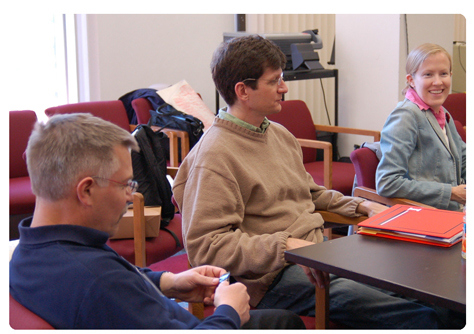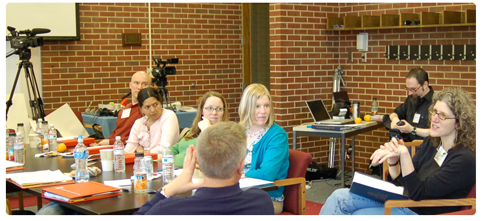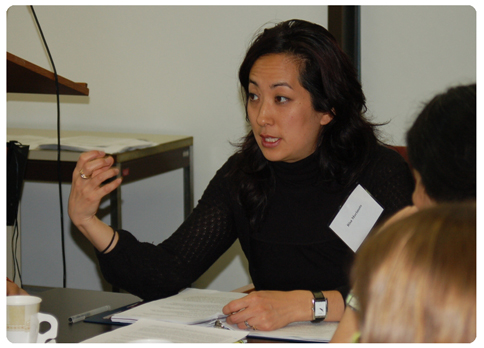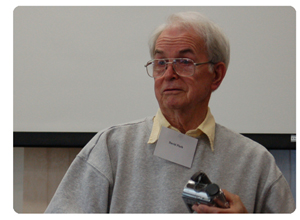
2008 Digital Asia: Documentary Digital Video Workshop
May 15- 17, 2008
University of Illinois
Urbana, Illinois
Presented by Center for East Asian and Pacific Studies (EAPS),
Asian Educational Media Service (AEMS),
and Applied Technologies for Learning in the Arts & Sciences (ATLAS)
at The University of Illinois at Urbana-Champaign
Over one intense weekend in May, ten scholars of Asian Studies gathered at the campus of the University of Illinois in Urbana to learn as much as they could about documentary filmmaking, through structured discussions and workshops during the day and informal conversations and film screenings in the evenings. Forty professors and graduate students applied for Digital Asia 2008, with full proposals for research-based video projects; of these we could accept only ten, hosted free of charge. Those accepted not only proposed engaging, relevant projects, but also demonstrated strong communications skills and the ability to frame their projects narratively for non-expert audiences. This was Digital Asia's second year.
Contents:
|
(Pictured: Paul Riismandel - Photo by Tanya Lee) |
Participants
Projects
Presenters
AEMS Staff
2008 Call for Proposals
Digital Asia Seed Grants
2008 Digital Asia Schedule
(PDF)
Participants
The following individuals completed the Digital Asia Workshop in 2008. Click on their names for descriptions of their projects.
Faculty
Nancy Abelmann
Home is where...?
Michael Brose
Islam in Southwest China
Jeffrey Dym
Incorporating Kamishibai (Japanese Paper Play) into the American Classroom
Digital Asia Seed Grant Recipient
Purnima Shah
Garaba dancing
Paul Watt
The Daily Life of a Japanese Buddhist Temple
Graduate Students
Muhammad Chozin
Illegal but Common: Life of Blast Fishermen in South Sulawesi, Indonesia
Sonja Downing
Gamelan Girls
Jennifer Goodlander
The Person Behind the Mask--Topeng Pajegan in Bali
Digital Asia Seed Grant Recipient
Justin Jesty
Wages of the Cold War
Emma Rose
Emerging technology usage: Mobile phones in Central Asia
back to top
Projects
Nancy Abelmann
Professor of Anthropology, Asian American Studies, and East Asian Languages and Cultures and Director of the Center for East Asian and Pacific Studies, University of Illinois
Home is where...?
Twenty years ago, Nancy Abelmann was in South Korea documenting the lives of activists. Now, she is going back with a video camera to document where those activists are today and explore how varied and “untraditional” their family structures have become (be it a functional divorce where parties still live together or an international marriage). A variety of individual families will be shown to explore the larger picture of what families can look like in contemporary South Korea. Abelmann will contextualize her video for viewers with less knowledge of South Korean history.
Michael Brose
Associate Professor of History, University of Wyoming
Islam in Southwest China
When people think of religions of China, rarely do they think of Islam. Michael Brose hopes that his video will offer a starting point for understanding Islam as an important part of Chinese culture. He will film in Yunnan province, where he has conducted several years of fieldwork. He wants this video will also help show that China is not the monolithic Han image many people envision, but rather is a complex country with many different people, cultures, and religions.
Muhammad Chozin
M.A. Candidate in Southeast Asian Studies Program, Ohio University
Illegal but Common: Life of Blast Fishermen in South Sulawesi, Indonesia
Illegal blast fishing is a common practice in South Sulawesi, Indonesia, and other regions in Southeast Asia, as most people in the communities know. What they do not know, however, is how blast fishing is done, or its detrimental impacts on the environment. Chozin will return to the area where he has done fieldwork to document blast fishing practices on video and to interview fishermen engaged in blast fishing about how they do business, dealing with society and government and the importance of networking in illegal fishing. Chozin's video will expose the realities of how the illegal blast fishing industry operates and contextualize it within Southeast Asia.

(Pictured: Michael Brose, Jeffery Dym, and Sonja Downing - photo by Tanya Lee)
Sonja Downing
Ph.D. Candidate in Ethnomusicology, University of California-Santa Barbara
Gamelan Girls
Balinese gamelan, a traditional form of percussion ensemble music, was until recently taught only to boys, but girls are now entering the field. Through her documentary video, Sonja Downing aims to illustrate theoretical points of gender construction by showing children's teachers' emphases on bodily learning and interactions during rehearsals and by illuminating how children learn and negotiate styles of movement in their gamelan playing – a physical and visual experience which must be seen to truly be understood. This project incorporates footage she has already shot on previous fieldtrips.
Jeffery Dym
Associate Professor of History, California State University Sacramento
A History of Kamishibai
Jeffrey Dym's project examines the history of kamishibai, an early twentieth-century form of Japanese storytelling using a series of picture-cards, from its inception to today in all of its manifestations, incorporating archival footage, photographs, people's reminiscences, voice-over analysis and commentary, as well as pictures and performances of actual kamishibai. As a dynamic, visual performance art, kamishibai lends itself perfectly to video.
Jennifer Goodlander
Ph.D. Candidate in the Program for Interdisciplinary Arts, Ohio University
The Expanding Role of Women in Traditional Balinese Performing Arts
Jennifer Goodlander studies women's expanding involvement in these traditional Balinese performing arts, specifically topeng (masked dance-drama) and wayang kulit (shadow puppetry), and how opportunities to perform in them affect women's lives in the context of family and community. Theatrical performance is meant to be seen; it happens in a moment on stage and then is forever lost, living on in memory. The movements/dance of the performers or puppets, the stylizes manipulation of the voice, and the complex relationship between musical instrumentation with the movement on stage are all vital to understanding Balinese theatre, lending it to a video project. Goodlander's project will strive to illustrate the complex relationships between tradition and changes in that tradition.
Justin Jesty
Ph.D. Candidate in East Asian Languages and Civilizations, University of Chicago
Wages of the Cold War
From 1951 to 1955, the Japan Communist Party (JCP) sought armed revolution, but most of the documentation has been destroyed – leaving oral history as some of the only evidence of this segment of post-WWII Japanese history, even though it impacted on the birth of the new Left and influenced postwar literature, film, and art . Justin Jesty hopes to interview a variety of people – in an attempt to portray them as complex human beings, rather than heroes or villains, enlisting the camera to capture their faces, bodies, voices, and surroundings. While interviews cannot replace the missing documentation, they give a human face to times past.
Emma Rose
Ph.D. Candidate in the Department of Technical Communication, University of Washington-Seattle
Emerging technology usage: Mobile phones in Central Asia
Together with a team from her research group, Emma Rose plans a documentary video that would help translate on-the-ground, contextualized understanding of mobile phone use in Central Asia for technology designers to help spark innovative design ideas inspired by the needs of the people in the region. Building on her 2006 design ethnography on how mobile phones fit into the rhythm of everyday life in Kyrgyzstan, Rose will collect footage there and in Tajikistan that can underscore these research finding and capture more data about technology adoption and the challenges of daily life.
Purnima Shah
Assistant Professor of Asian Performance, Duke University
Garaba dancing
Garaba dances have survived as a form of Goddess worship in Gujarat in western India, but today it is either fading away or changing dramatically under the influences of modernity, industrialization and globalization. In small communities elders make continual efforts to keep traditional garaba alive, but elsewhere it has either been reinvented--remixed with modern styles by pop singersfor the dance floor—or simply disappeared. At weddings garaba songs are being replaced by songs from Hindi films. Purnima Shah will document surviving traditional garaba dance and explore the causes for garaba being transformed or lost both in India and in the Gujarati diaspora in the United States.

(Pictured, left to right: Justin Jesty, Purnima Shah, Emma Rose, Michael Brose, Jennifer Goodlander, Paul Riismandel, and Nancy Abelmann - photo by Tanya Lee)
Paul Watt
Professor and Director of Asian Studies, DePauw University
The Daily Life of a Japanese Buddhist Temple
The local temple is an important part of daily life in Japan . It is a center of activity and reflection. Paul Watt's documentary will explore how the temple is integrated into everyday life and serves as a personal center as well as a community gathering place – from a place to walk the dog to a place for private devotions, a place for calligraphy lessons and festivals as much as a place to come alone. Filming over the course of a year in Tokyo, Watt will include interactions between priests and the public as well as historical context and explanations of activities being performed in hopes to give a feel for the place that is such an important part of the community.
back to top
Workshop Presenters
Invited Presenters
Ellen Bruno
Linda Hoaglund
Risa Morimoto
Digital Asia Planning Committee
David W. Plath
Jacquetta Hill
Paul Riismandel
Colleen Cook
Invited Presenters
Ellen Bruno Both filmmaker and international relief worker, Ellen has spent much of the last 20 years in southeast Asia.
She began her relief efforts more than 25 years ago in Mexico, working in remote Mayan villages. Since then she has worked in refugee camps on the Thai-Cambodian border, as field coordinator for the International Rescue Committee, and as director of the Cambodian Women's Project for the American Friends Service Committee. She has been a hospice worker for the Zen Hospice Project in San Francisco, providing bedside assistance for people dying of AIDS and cancer.
Ellen completed a masters degree in documentary film at Stanford University in 1990. Her first film Samsara, her Masters thesis at Stanford, documents Cambodian life in the aftermath of Pol Pot's killing fields. Satya: A Prayer for the Enemy is based on the experiences of young Tibetan Buddhist nuns who have been imprisoned and tortured for their nonviolent protests of the Chinese occupation of Tibet. Sacrifice is the final installment in her Asian trilogy. All three films premiered at the Sundance Film Festival. Ellen was awarded a Guggenheim Fellowship in 1998, a Rockefeller Fellowship in 1997, fellowships from the Western States Media Arts and a Shenkin Fellowship from Yale University School of Art.
Information on her films, including trailers and and how to purchase, can be found on her website: www.brunofilms.com
You may also read a review of Samsara in the Journal of Asian Studies (republished here on the AEMS website). Satya is available for loan through the AEMS local media library.
Linda Hoaglund Film advisor for the Japan Society in New York, Linda was born and raised in Japan, the daughter of American missionary parents, she attended Japanese public schools. A graduate of Yale University, after working as a bilingual news producer for Japanese television, she joined an independent American film production company as a producer. Since 1996, she has subtitled 200 Japanese films. She represents Japanese directors and artists and serves as an international liaison for producers. In 2004, she received a commendation from the Foreign Minister of Japan for her work promoting Japanese film abroad.

(Pictured: Risa Morimoto - Photo by Tanya Lee)
Risa Morimoto Producer of the feature film, The LaMastas, Risa produces, writes, and directs for film and television. She produced the award-winning program Cinema AZN, a half-hour show on Asian film. President of Edgewood Pictures Inc., a motion picture production company, Risa graduated with a masters degree in film and education from New York University in 1999 where she served as the Associate Director of the Asian/Pacific/American Studies Program and Institute. From 2002-2006, she served as Executive Director of Asian CineVision, a non-profit media arts organization. A second-generation Japanese American, Risa studied at Doshisha University in Kyoto, Japan.
Together, Linda and Risa co-produced the film Wings of Defeat, a thoughtful and moving look back on the phenomenon of Japanese kamikaze missions at the end of World War II, with rare interviews in which surviving kamikaze pilots tell their own stories. More information is available at the Wings of Defeat website. Wings of Defeat is available for loan at the AEMS local media library.
back to top
Digital Asia Planning Committee
David W. Plath Emeritus profess
or of anthropology and Asian Studies in the
University of Illinois at Urbana-Champaign, David Plath has designed and written all
Media Production Group programs, and has served in them variously as producer, host, narrator, editor, director and videograp

her. A founding member of
MPG in 1989, he took on its leadership after the death of co-founder Jackson H.Bailey a decade ago. In 2
000 the Society for East Asian Anthropology established a
David Plath Media Award, given every other year for the best new educational media product on Asian culture and society. Plath has published six books and more than 60 articles on topics in anthropology and Japan Studies. In addition to his 35 years on the faculty at Illinois-Urbana he has taught at the University of California at Berkeley, the University of Iowa, and Konan University in Kobe. He also has been a visiting researcher in Kyoto University, The National University of Singapore, and Japan's National Institute for Media Education.
Currently he has three documentaries in various stages of production, one set in a regional city in northeastern Japan and two among the Lahu people of northern Thailand.
Jacquetta Hill Emeritus professor of Anthropology and Educational Psychology at the University of Illinois, Urbana-Champaign, Hill has used video in her ethnographic research (beginning with reel to reel, black and white) in Puerto Rican neighborhoods and schools in Chicago, in rural schools with Latino student populations, and in schools and mountain villages in Thailand in. Though early these were intended as primary data collection resources, more recently they have been for documentary production. For about three decades she has been studying, working with and publishing on the Tibeto-Berman speaking Lahu peoples of Northern Thailand . She began working in documentary videography with David Plath as consultant anthropologist and narrator in the 1992 production Candles for New Years. She has taught visual ethnography courses at the UIUC. She was a founding member of the Council on Anthropology and Education of the American Anthropological Association and recipient of the G. Spindler Award for outstanding contribution to that field. Currently she is studying and publishing on the dance and music of the Lahu Na Shehleh and, with David Plath, producing a documentary on the anthropology of dance and music among the Lahu.
Paul Riismandel Paul is the Director of Curricular Support for the School of Communication at Northwestern University, where he oversees the use of digital media technologies for use in the classroom, as a supplement to classroom instruction, for distance education and for research and administrative purposes. His primary focus is Internet audio and video, both in terms of producing content that best takes advantage of this medium, as well as the technical infrastructure that supports it.
Prior to joining Northwestern, Paul was the Manager of Digital Media Production and Support for eight years at ATLAS, the technology support department serving the College of Liberal Arts and Sciences at the University of Illinois. At ATLAS Paul built a digital media service to serve the diverse needs of the College and collaborated with other media producers and users on campus to build a robust live and archive streaming media infrastructure. He has led or participated in numerous workshops and panels on educational media, in addition to designing and teaching an undergraduate course on creating and understanding digital media.
Paul is also a contributing editor to Streaming Media magazine where he writes the "Class Act" column on educational online media.
Colleen Cook Colleen is a coordinating producer for ATLAS at the University of Illinois Urbana-Champaign, where she assists educators in developing new media for use in their curriculum. She received her BFA from Florida State University 's School of Motion Picture, Television, and Recording Arts, before coming to UIUC for her master's degree in Educational Policy Studies focusing on educational media distribution. Trained in both film and video production, she is most comfortable behind the camera and has traveled as a videographer in Thailand and Argentina . Her interest in educational media distribution stems from her experience running an independent film theatre which provided the community with annual international film festivals, in addition to its regular fare of foreign, independent, and art films.
back to top
AEMS Staff
Jason Finkelman, AEMS Events Coordinator
Tanya Lee, AEMS Director
Susan Norris, AEMS Assistant Program Director
Jason Lee, AEMS Student Intern
back to top
Last Updated: November 26, 2008


 her. A founding member of MPG in 1989, he took on its leadership after the death of co-founder Jackson H.Bailey a decade ago. In 2000 the Society for East Asian Anthropology established a David Plath Media Award, given every other year for the best new educational media product on Asian culture and society. Plath has published six books and more than 60 articles on topics in anthropology and Japan Studies. In addition to his 35 years on the faculty at Illinois-Urbana he has taught at the University of California at Berkeley, the University of Iowa, and Konan University in Kobe. He also has been a visiting researcher in Kyoto University, The National University of Singapore, and Japan's National Institute for Media Education.
her. A founding member of MPG in 1989, he took on its leadership after the death of co-founder Jackson H.Bailey a decade ago. In 2000 the Society for East Asian Anthropology established a David Plath Media Award, given every other year for the best new educational media product on Asian culture and society. Plath has published six books and more than 60 articles on topics in anthropology and Japan Studies. In addition to his 35 years on the faculty at Illinois-Urbana he has taught at the University of California at Berkeley, the University of Iowa, and Konan University in Kobe. He also has been a visiting researcher in Kyoto University, The National University of Singapore, and Japan's National Institute for Media Education.